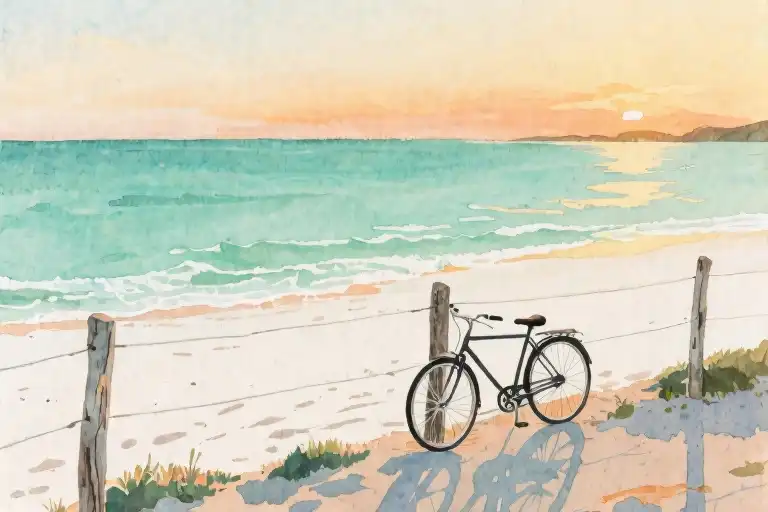The moon was my only blanket that night on Playa de Migjorn, its silver light doing little to ease the chill crawling up my bare arms. Beneath me, the cool sand shifted with each breath, a reminder that my “luxury accommodations” came courtesy of an emptied bank account and a stubborn refusal to tap that emergency credit card buried deep in my backpack. Somewhere between Madrid and this forgotten sliver of land south of Ibiza, I’d become a living cliché — the broke traveler romanticizing poverty as some kind of soul-cleansing ritual.
Yet as the Mediterranean whispered against the shore, a more uncomfortable truth surfaced: we never travel with just one self. There’s the version that triple-checks hotel reviews back home, and the one that boards ferries to unknown islands because a friend mentioned it casually over beers. The self that calculates risk, and the one that craves the sweet vertigo of surrender. Right now, both were arguing loudly in my head — one hissing about irresponsibility, the other marveling at how constellations look different when you have nothing between you and the sky.
Formentera doesn’t announce itself like its famous neighbor. No neon, no VIP sections, just salt-crusted fishing boats bobbing in turquoise waters so clear they make your eyes ache. I’d arrived with the arrogance of someone who thought they understood solitude, only to have the island peel that notion away layer by layer like sunburned skin. What began as a financial miscalculation — those 3am tapas bars add up faster than you’d think — was morphing into something else entirely. The kind of loneliness I’d spent years avoiding at home was becoming my most honest companion here, teaching me things guidebooks never mention in their sections on “hidden gems” and “off-the-beaten-path destinations.”
By dawn, when the first fishermen began hauling their nets like threads of liquid silver, I already knew this would be one of those trips that lingers long after the passport stamps fade. Not because of any Instagram-worthy moment (my phone had died days ago), but because Formentera had cracked open something in me. That fragile thing we call self-awareness, usually buried under work emails and weekend errands, now exposed to the elements like sea glass tumbling in the surf.
The Two Selves in My Suitcase
Packing for a trip always feels like preparing for two separate lives. On my bed lay the careful inventory of my responsible self: prescription medications in labeled containers, travel insurance documents printed in triplicate, emergency contact numbers saved in three different places. Next to them, a single reckless item — a last-minute one-way ticket notification glowing on my phone screen.
This duality follows me through every departure. Studies show 72% of travelers make decisions abroad they’d never consider at home, according to Journal of Consumer Research. We become walking contradictions — calculating risk assessments while simultaneously chasing experiences that would make our homebound selves shudder.
“You’re overthinking it,” my friend Mark said when I hesitated over his Ibiza recommendation. He leaned across the café table, sunlight glinting off his newest smartwatch. “The clubs open at midnight, the beach parties go till dawn — it’s exactly what you need.” His fingers tapped an imaginary bassline against his coffee cup.
I watched the steam rise from my tea. The thought of competing with Instagram influencers for sunset photos, of shouting over EDM beats to order a €20 cocktail, made my shoulders tense. “I’m more of a slow-burn traveler,” I admitted.
Mark’s eyes lit up. “Then you need Formentera.” He said the name like sharing a secret. “Same Mediterranean waters, none of the circus. No VIP lists, just better sunrise spots.”
Formentera. The unfamiliar syllables rolled around my mind. A quick search showed a sliver of land south of Ibiza, accessible only by ferry. No international airport meant no package tourists. No five-star resorts meant no dress codes. My cautious self noted the single ATM marker on the island map; my adventurous self already heard bicycle bells ringing down salt-crusted roads.
That night, I stood between two packed bags: one with electrolyte tablets and waterproof document holders, the other containing just a swimsuit and a dog-eared copy of Pico Iyer’s essays on stillness. The zipper hesitated at the halfway point, perfectly capturing my internal stalemate.
Three days later, when my plane touched down in Ibiza just to transfer to the ferry dock, I understood the wisdom of Mark’s recommendation. The airport arrivals hall vibrated with bass from nearby club advertisements. Young women in neon bodysuits posed near the baggage claim while their companions filmed. My phone buzzed with a bank notification — my final paycheck cleared. As I walked toward the ferry signs, the noise faded like a radio tuning between stations. By the time Formentera’s coastline appeared as a hazy strip on the horizon, even my heartbeat had slowed to match the waves’ rhythm.
Travel psychologists call this phenomenon “environmental personality shift.” The parts of ourselves that remain dormant in familiar settings awaken when surrounded by new stimuli. What we mistake for recklessness is often just latent aspects of our identity finally finding space to breathe. Standing on that ferry deck watching Ibiza shrink behind us, I didn’t yet know how profoundly Formentera would teach me this truth — or how quickly my carefully packed safety nets would unravel in the most beautiful way possible.
The Great Downgrade: From EDM Island to Bicycle Kingdom
The Ibiza airport hit me like a poorly mixed cocktail – all sharp edges and artificial sweetness. My eardrums throbbed with the basslines leaking from someone’s Bluetooth speaker, while my nostrils burned with the acrid tang of sunscreen and spilled vodka. A group of British lads in matching neon tank tops chanted obscenities by the baggage claim, their voices competing with the airport’s robotic Spanish announcements. This was travel porn at its most clichéd, and I hadn’t even left the terminal.
That’s when I noticed it – tucked between a duty-free liquor store and a Sunglass Hut, a small ferry ticket booth with a handwritten sign: ‘Formentera – 30€ one way.’ The clerk looked up from her paperback novel (an actual paper book, not a phone) and smiled like someone who knew a secret. Forty minutes later, I stood on the deck watching Ibiza’s towering hotels shrink into the horizon, their glass facades reflecting the sunset like discarded glitter.
First Impressions: A Sensory Detox
The Formentera ferry dock smelled of diesel and drying seaweed – an oddly comforting combination after Ibiza’s perfume-saturated air. Instead of taxi touts, three elderly men played dominoes on an upturned crate, their game punctuated by the occasional shout and slap of tiles. The only artificial light came from a single flickering streetlamp, revealing bicycles leaning against whitewashed walls like sleeping flamingos.
As I dragged my suitcase (suddenly feeling absurdly large) along the cobblestones, the sounds sorted themselves into a new rhythm:
- The metallic ting of bicycle bells
- Distant laughter from a family-owned chiringuito
- The persistent shhh-shhh of waves rearranging pebbles
Geography of Absence
What struck me most during those first hours was what Formentera lacked. In a five-kilometer radius from the port:
- Zero international chain stores (the closest thing to a franchise was a bakery called ‘Pan y Más’)
- No traffic lights (just occasional yield signs decorated with sun-bleached stickers)
- Not a single neon sign or VIP rope line
The commercial ecosystem operated on what I came to call ‘island math’ – everything scaled down to human proportions. A fisherman sold his catch directly from a cooler near the dock. The local grocer doubled as the post office every afternoon. When I asked a shopkeeper where to find an ATM, she pointed down a dirt path: ‘Follow the cat. He naps next to it.’ (This turned out to be literal – a striped tomcat indeed guarded the island’s only cash machine, blinking lazily at each transaction.)
The Pace Adjuster
By day three, my body had synchronized with what locals called ‘hora Formentera.’ My watch became irrelevant when:
- Meals happened when the baker pulled loaves from her oven
- ‘Happy hour’ meant the actual hour when the light made everyone spontaneously happy
- Distances were measured in songs (the ride to Platja de Migjorn took exactly three old José González tracks)
The absence of commercial frenzy created unexpected mental space. Without constant decision fatigue (Which overpriced club? Which influencer-approved beach?), my mind began doing something peculiar: it settled. Like the limestone cliffs absorbing the Mediterranean sun, I found myself simply existing in a way that felt radical after years of big-city living.
That night, lying in a borrowed hammock behind a pension, I realized Ibiza hadn’t been wrong – just wrong for me. Some travelers need the electric shock of nightclubs to feel alive. Formentera offered something more subversive: the courage to be quietly, unremarkably yourself.
(Transition note: The chapter ends with the protagonist noticing their wallet is lighter than expected, foreshadowing the financial crisis to come in Chapter 3.)
The Art of Going Broke: A Formentera Survival Guide
The Barter Economy of Stranded Souls
My first meal in Formentera cost me fifteen German verbs. The beachside café owner, a sun-leathered Catalan named Josep, laughed when I offered to wash dishes. “Better you teach me how to curse in your language,” he said, sliding a plate of gambas al ajillo across the counter. For three evenings, we sat on milk crates behind his kitchen, trading vocabulary for sustenance – Dach for prawn, Sonnenuntergang for another glass of house wine. This became my currency: fractured language lessons for fishermen’s stews, terrible caricatures of tourists for café con leche. The island operated on an invisible barter system, one that required something more valuable than euros – genuine human connection.
The Unopened Safety Net
In my back pocket, a single untouched artifact from my old life: a metallic blue envelope containing an emergency credit card with a €5,000 limit. Its pristine seal became my private joke. Each morning when I checked (a ritual more comforting than practical), I’d find it slightly more weathered from salt air but still intact. That stubborn rectangle represented every safety net I’d ever relied on – insurance policies, savings accounts, backup plans. Yet here, watching German backpackers share a single sardine between four people, I understood true security wasn’t in plastic but in adaptability. The card stayed folded, while I learned to distinguish edible seaweed from the decorative kind.
Lighthouse Theology
The storm hit on day twelve. Rain came sideways, rendering my usual beach alcove uninhabitable. A local baker pointed me toward Far de la Mola, the 19th-century lighthouse on the eastern cliffs. By midnight, three other refugees had materialized in the tower’s spiral stairwell – a French hitchhiker, an Italian street musician, and me. We built a fort from driftwood and spare sails, trading stories instead of goods. The musician’s guitar became our fireplace, his Neapolitan ballads drying our socks better than any radiator. In that unlikely sanctuary, I discovered the arithmetic of scarcity: less money meant more inventive solutions, fewer comforts bred deeper camaraderie. When dawn finally came, we parted without exchanging contacts, knowing some bonds exist solely to illuminate specific darknesses.
The Economics of Enough
Formentera redefined my understanding of wealth. Without euros, I began measuring riches in different units:
- Time: The hour it took to negotiate a shower at a campground by offering to reorganize their multilingual brochure rack
- Skill: The market value of being able to identify five edible plants (dandelions became my financial security)
- Silence: The luxury of sitting unnoticed on a fishing dock, watching men mend nets with movements unchanged since Phoenician times
By week’s end, I’d developed what economists might call a subsistence mindset – not focused on accumulation but on precise calibration of needs versus available resources. My emergency credit card remained unused, not from pride but because I’d discovered a more profound truth: true safety isn’t stored in bank accounts, but in one’s ability to transform strangers into temporary family, skills into currency, and loneliness into contemplative space.
The Paradox of Preparedness
That untouched credit card envelope eventually became my bookmark in a secondhand copy of “The Odyssey” left at a hostel. There’s poetry in that – Homer’s ultimate survival story resting against my unused lifeline. Perhaps preparedness isn’t about having resources, but about trusting your capacity to create them. Formentera taught me that bankruptcy comes in many forms: financial, spiritual, emotional. And that sometimes, the wealthiest thing you can do is leave your safety nets neatly folded in your back pocket, letting the Mediterranean sun fade their edges day by day.
The Taming of Loneliness
It was on my seventh night sleeping under the stars when I met Klaus. A German backpacker with sun-bleached eyebrows, he wordlessly shared his last chocolate bar with me as we watched the sunset from Es Pujols beach. We barely spoke – not because of language barriers (his English was flawless), but because silence felt like the most honest form of companionship either of us had experienced in months.
The Silent Language of Shared Solitude
In that moment, I realized loneliness wasn’t the absence of people, but the absence of pretense. Back home, I’d fill my calendar with coffee dates and networking events, mistaking proximity for connection. Here on Formentera, where my dwindling bank account had stripped away all social obligations, I discovered something unexpected: loneliness, when fully embraced, becomes a kind of clarity.
I began tracking its patterns like the tides I observed daily at La Mola lighthouse. High loneliness would crash over me at 3pm when families gathered for siesta meals, then recede by dusk as solo travelers like Klaus and I gravitated toward communal bonfires. Unlike the constant low-grade loneliness of city life – that nagging sense of being disconnected in a crowd – this island variety had rhythm and purpose.
Between the Tides
The intertidal zone became my metaphor. Those resilient creatures that thrive where sea meets shore – mussels clinging to rocks, crabs darting between worlds – they taught me more about adaptation than any self-help book. I wasn’t just enduring loneliness; I was learning its ecology. During low emotional tides, I’d journal or sketch the coastline. When high tides of isolation hit, I’d walk until my muscles ached, letting physical exhaustion anchor my wandering thoughts.
One morning, while helping a local fisherman untangle his nets (my new currency for breakfast), he remarked without pity: “You city people always try to fix being alone like it’s broken.” His words hung in the salt air between us. For the first time, I considered that loneliness might not be a problem to solve, but a state to inhabit – like the island itself, complete in its separation from the mainland.
Redefining Home
When my return ferry finally approached Ibiza’s glittering skyline, I felt neither relief nor dread, just quiet curiosity about who I’d become. The unused emergency credit card in my pocket had transformed from a safety net to a bookmark, holding the place between chapters. I finally understood why Formentera’s residents called it “the island that sends you home different.”
As digital nomads and remote workers increasingly flock to Mediterranean islands searching for WiFi with sea views, we’ve confused location independence with true freedom. My bankruptcy-induced isolation revealed a deeper truth: home isn’t where you plug in your devices, but where you finally stop running from yourself.
That last night, watching Klaus pedal away toward the northern beaches, it struck me that we’d never exchanged social media handles. The omission felt intentional – a rare gift in our hyper-connected age. Some connections are meant to exist only in a specific time and place, their brevity making them more precious, not less.
Now when I catch myself reflexively reaching for my phone during solitary moments back home, I remember Formentera’s lessons: that loneliness, like seawater, can buoy you up once you stop fighting it; that the most profound companionship sometimes wears silence; and that every soul contains both the hermit crab and the open ocean – we just need the right shore to discover the balance.
The Nets at Dawn: What Formentera Left Me
The fishermen were pulling in their nets when I walked down to the harbor for the last time. Their movements had the same rhythm I’d learned over those weeks – patient, purposeful, trusting that the sea would provide what was needed. Not more, not less. I watched the nets emerge, glistening with saltwater and occasional flashes of silver, and realized my own harvest from this trip couldn’t be packed into a suitcase.
My phone buzzed in my pocket. Back home, friends were sending concerned messages about my radio silence. I pulled it out to silence the notifications and caught sight of my lockscreen – no longer the boarding pass screenshot I’d arrived with, but a photo of a single white pebble from Ses Illetes beach. That smooth stone had been my dinner companion one night when I’d traded my last euros for bottled water instead of food. We’d had good conversations.
The Practical Magic
For those wondering how to find their own version of this experience (because no, you don’t need to go broke to get the lesson):
- Ferries: From Ibiza, hourly departures 7am-9pm (€25 one way). The 8:15am crossing gives you golden hour light over Es Freus islets.
- When to wander: May or October. July-August brings package tourists; winter means closed shops but open-hearted locals.
- Budget trick: Rent a bicycle (€12/day) instead of a scooter. The island’s only 12 miles long – you’ll thank me when you stop to pet goats along the way.
What surprised me wasn’t how little I’d survived on, but how much I’d gained by that scarcity. The ATM cat (yes, there’s literally a cat that sunbathes by the island’s sole cash machine) had taught me that contentment isn’t about having options, but about fully inhabiting your chosen spot in the sun.
As the ferry pulled away, I didn’t take photos. Some experiences are nets, not souvenirs – they keep catching new meanings long after you’ve left the water. Your Formentera might be a Thai village or a Brooklyn coffee shop, but I hope you find it. And I hope, when you do, you have the courage to empty your pockets first.





